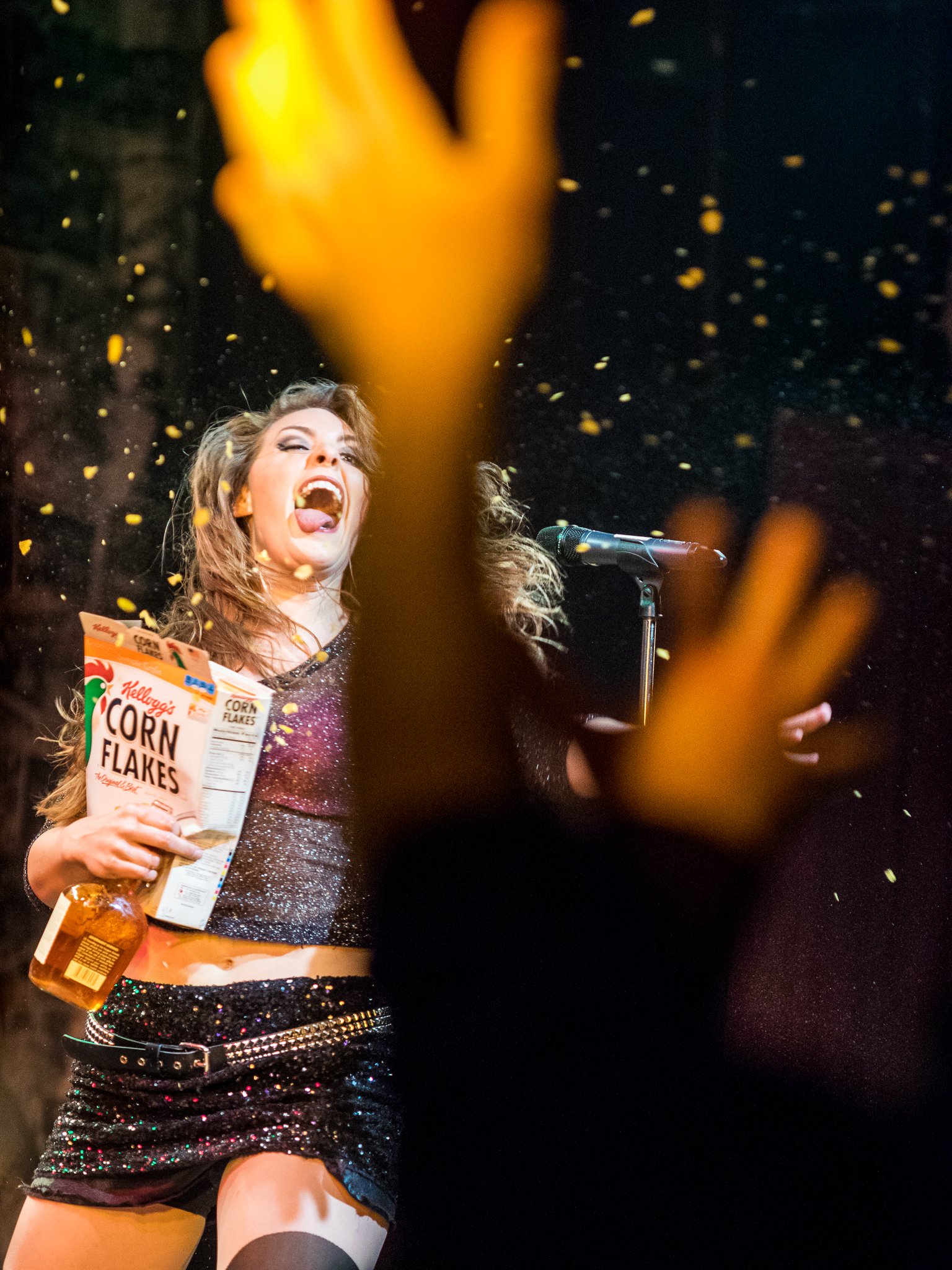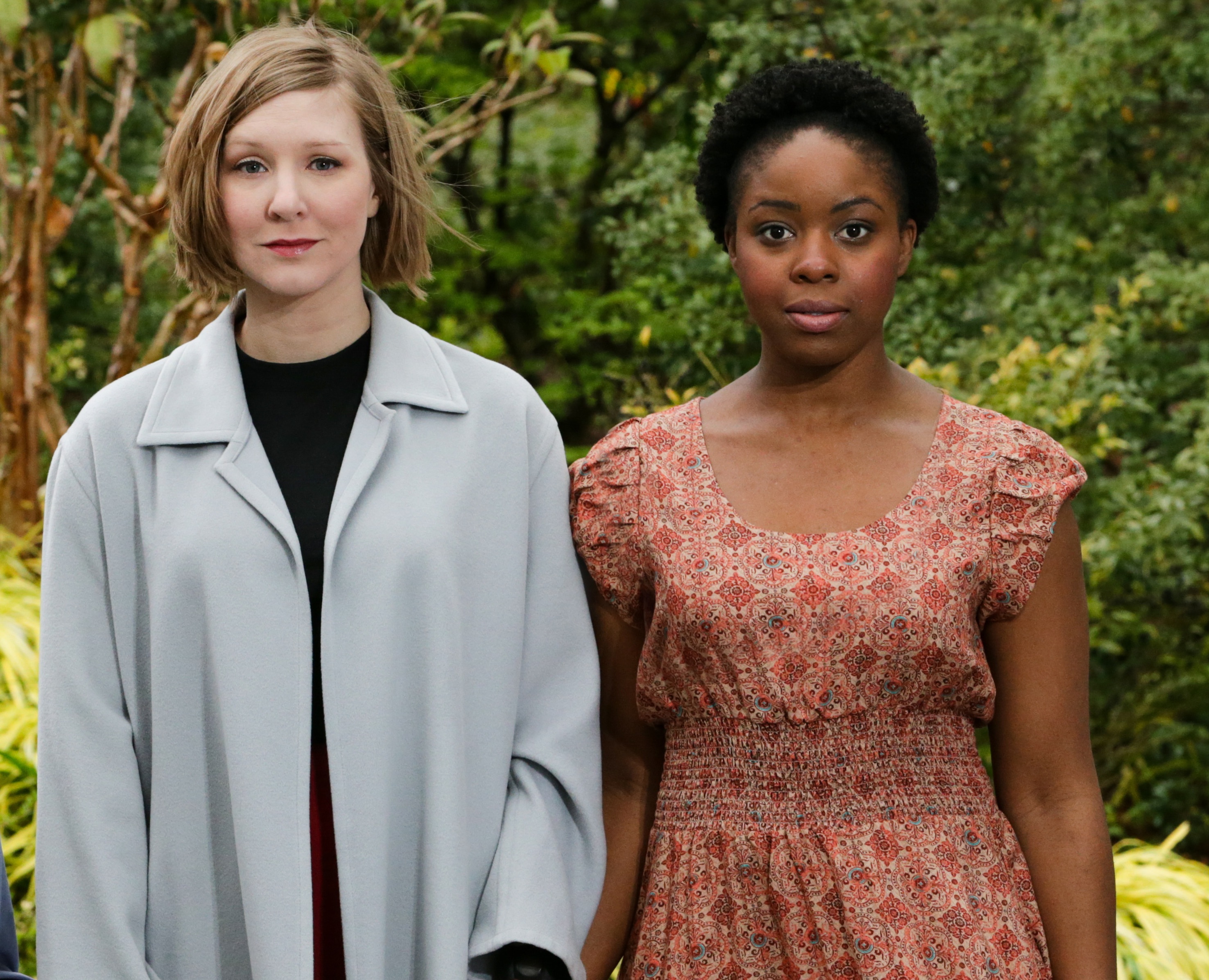Opening Nights
Angry Housewives
ArtsWest, 4711 California Ave. S.W., 938-0339, artswest.org. $17–$36.50. 7:30 p.m. Wed.–Sat., 3 p.m. Sun. Ends May 24.
After watching 1979’s Rock ’n’ Roll High School, I wanted to be in a punk band. How hard could it be? In late elementary school, my friends and I formed a group called RAF. We had a drum set—a Tupperware container of bottle tops—and some stellar lyrics about nuclear bombs. Watching this revival of the long-running ’80s musical, created by A.M. Collins and Chad Henry, I experienced an intense wave of ’80s nostalgia. Whatever the show’s original punk-feminist spirit, today it provides simple and almost wholesome entertainment, like riding the Duck.
Widowed Carol (Ann Cornelius), divorced music teacher Bev (Heather Hawkins), unhappily married Jetta (Chelsea LeValley), and single bridge operator Wendi (Janet McWilliams) decide that forming a band will be more profitable than hawking pyramid-scheme cosmetics. (Thirty years later that’s probably still true.) From there we witness how adapting punk personas creates both empowerment (for them) and disapproval (from their men). Ably directed by Shawn Belyea, the entire cast provides potent performances—including the signature tune “Eat Your Fucking Cornflakes.” A keenly comic moment ensues when Carol’s son Tim (Trent Moury), a punk himself, confronts these covert middle-aged rockers. Mom! You’re embarrassing me!
Though billed as a punk-rock musical, Angry Housewives features a mostly traditional score, plus some choreography (by Troy Wageman) that wouldn’t look out of place on Broadway during the ’30s. Dennis Culpepper’s set is strewn with handbills that evoke the pre-Internet era of band promotion, augmented by videos from Brianna Larson and Brody David. Yet K.D. Schill’s lazy costume design hits the wrong end of the ’80s: The large hair bows and oversized jean jackets are post-Madonna, while Collins’ original conceit sprang from the Patti Smith era. Spiky-haired Tim sports a Ramones T-shirt while carrying a Nike backpack. Nothing says counterculture like a corporate sports logo.
Yet Angry Housewives has its nostalgic pleasures, including its heroines’ determination to “make vinyl.” Somehow mp3s and Instagram just aren’t as punk. Alyssa Dyksterhouse
PCat on a Hot Tin Roof
ACT Theatre, 700 Union St., 292-7676. $15–$44. Tues.–Sun.; See acttheatre.org for schedule. Ends May 17.
The choice of Laura Griffith and Brandon O’Neill for Maggie and Brick—two examples of the superb casting of ACT’s current Cat on a Hot Tin Roof, directed by Kurt Beattie—was for me a revelation, since I’d only ever seen them in musicals (most recently as the hero and heroine of the 5th Avenue’s Carousel ). There can’t be many actors with both Tennessee Williams and Gilbert and Sullivan on their resume, but O’Neill’s portrait of the multiply wounded ex-athlete (kids, some advice: Don’t peak in high school) is a cocktail of bitterness and dry, resigned wit, wringing an amazing amount out of so few words. He speaks one for every 50 Maggie does in his Act 1 scene with Griffith, turning unflappability into emotional abuse in an epic clash of the irresistible and the immovable. Yet if Brick were merely an ice-cold villain, you’d never buy that Maggie could continue to be so hot for him; it’s a tightrope O’Neill walks expertly.
Advertently or not, Griffith’s Maggie and John Aylward’s breathtakingly good Big Daddy come off as fascinating mirror images. Part of this is the performers’ easy physicality; they seem analogously comfortable in their (extremely different) skins. (Watching Aylward, I thought of Carroll O’Connor’s Archie Bunker and the curious grace in the way he lumbered across a room, shoulders rolling.) They’re monstrous and sympathetic, sometimes turning in a millisecond; you’re as captivated as you are appalled. Contempt for the “mendacity” surrounding them is their fuel, truth their driving engine and their weapon—wielded cruelly, yet somehow you can’t help cheering for them (considering the rest of the family is even more vile). Still, Maggie’s triumph comes when she abandons truth for her one big final lie, which Griffith plays like a diva’s exit aria.
Only an occasional hint of caricature—which leads to laughs, which leads to a slight emotional distancing—keep Marianne Owen’s Big Mama and Morgan Rowe’s Mae, both performances full of panache, from perfection. Charles Leggett, as Mae’s husband Gooper (Brick’s older brother), is highly effective in his character’s ineffectuality. I also want to mention Kyle Ballard, Kai Borch, Annika Carlson, and Nina Makino, excellent as Mae and Gooper’s four loathsome brats; shrieking like the violins in Bernard Herrmann’s Psycho score, they provide incidental music from hell.
Testament to the skill of the acting is that the play’s frankness of language and subject matter became startling, even shocking, simply because the cast recreates the milieu so well. To make this material pack a punch similar to what it must have done at its 1955 premiere—in our age of The Book of Mormon, Broad City, and Amy Schumer—is some feat. Ah do declare, all that talk of “fornicatin’ ” and “queer” and “unnatural”—if I’d’a been wearin’ pearls, I’d’a clutched ’em. Gavin Borchert
PLittle Bee
Center Theatre at the Armory (Seattle Center), 216-0833. $25. Runs Wed.–Sun.; see book-it.org for schedule. Ends May 17.
In Book-It’s version of Chris Cleave’s 2008 novel (adapted and directed by Myra Platt), who in the world gets to live in peaceful prosperity is the thorniest of many conundrums, nestled like an artichoke heart among interlocking barbed petals. In the play’s primal scene (which comes late in the first act), Brits Sarah and Andrew cavort on a Nigerian beach where they meet locals Little Bee and her sister just before the adolescent girls are kidnapped by insurgents. True character is revealed during these harrowing moments; afterward, these scarred individuals must come to terms with what they have seen in themselves and in others. It’s an undeniably potent formula for drama, and this moving interpretation takes good advantage of the setup. Atmospheric sound by Evan Mosher, lights by Andrew D. Smith, and Will Abrahamse’s flexibly austere sets help lubricate the shifts between Africa and England, where Little Bee is unexpectedly reunited with the Brits a few years later.
For the sake of suspense, I’m dancing around what happens on the beach, and some other reveals, despite the book’s wide readership. (A Nicole Kidman film adaptation is rumored.) Suffice it to say that the bond between Sarah (a wistful, compelling Sydney Andrews) and Bee quickly eclipses most others, including Sarah’s marriage to Andrew (Eric Riedmann) and her extramarital courtship with British Home Office-er Lawrence (Michael Patten). Still, the show depends—and succeeds—on the basis of its star: Claudine Mboligikpelani Nako. With shy smile and unflinching gaze, her Little Bee radiates intelligence even while puzzling over such cross-cultural mysteries as how a coffee table can be made of coffee. She elicits reckonings from all who confront her. And her melding of gallows humor and hope, expressed in painstaking Queen’s English, melts hearts onstage and in the audience.
Per Book-It recipe, there’s a lot of direct address as characters share inner thoughts and desires (plus dutiful exposition). A few glaring improbabilities mar the second act—particularly the contradictions between Lawrence’s words and actions. One could also squint at the wish-fulfillment ending, but this would be to let cynicism mutate the dream gene. Little Bee posits a reverie that deserves to be indulged: a First-Worlder reaching outside her comfort zone to support a refugee’s birthright to a decent life. Margaret Friedman
E
stage@seattleweekly.com





